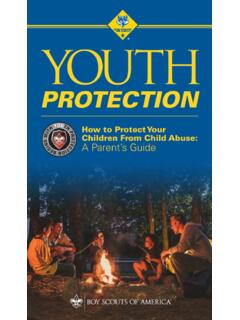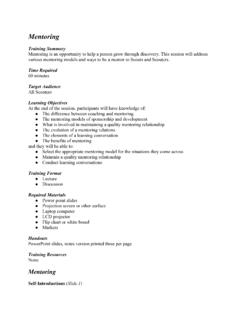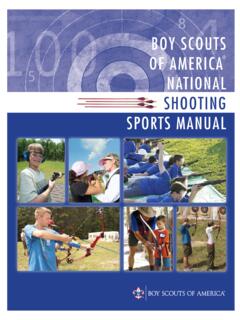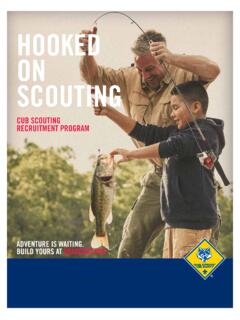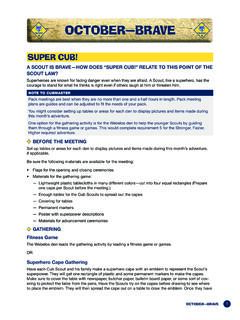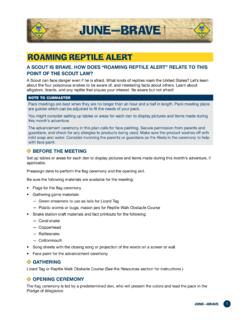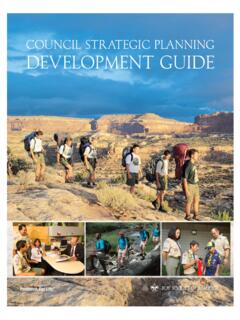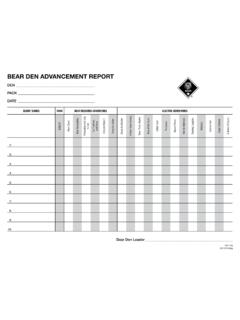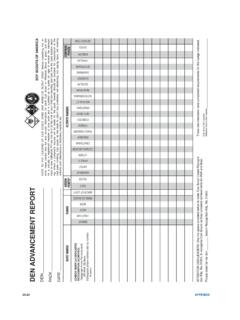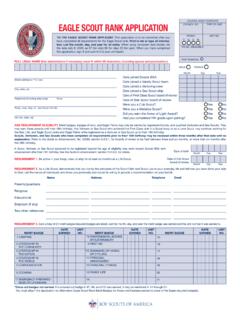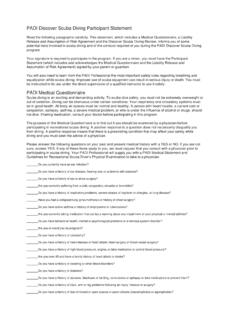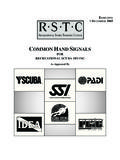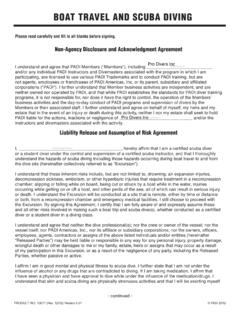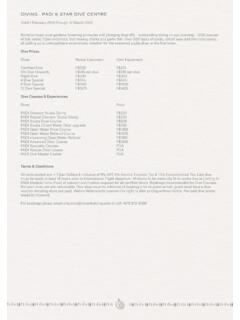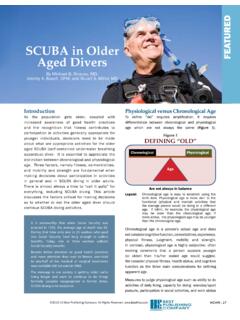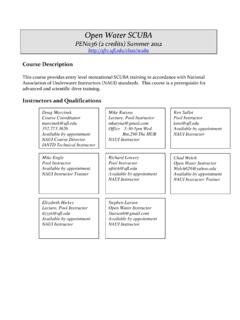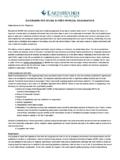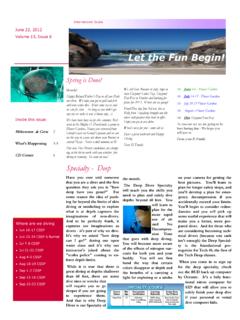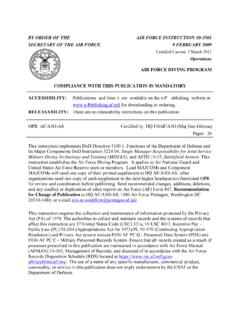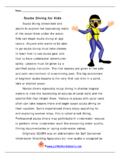Transcription of The Scuba BSA program was created and implemented with ...
1 The Scuba BSA program was created and implemented with assistance from International PADI, Inc.; bSaScuba BSA introduces qualified Boy Scout, Venturing, and registered adult participants to the special skills, equipment, and safety precautions associated with Scuba diving ; encourages aquatics activities that pro-mote fitness and recreation; and provides a foundation for those who later will participate in more advanced underwater Scuba BSA experience contains two parts Knowledge Development and Water Skills Development. During the first part, participants learn basic dive safety information and overview skills to be used during their water experience.
2 The Water Skills Development session introduces essential dive skills, such as mask clearing, regulator clearing, and alternate air source Scuba BSA program is conducted in clear, confined water by an instructor certified by diving organiza-tions recognized by the BSA. Completion of Scuba BSA requirements sets the stage for additional training but does not qualify the participant to dive independently, either in confined water or open-water environments. Scuba BSA is not a diver SafetyScuba diving is an advanced swimming activity. Safe Swim Defense guidelines, as found in the Guide to Safe Scouting, apply, but must be extended to cover under-water communication, the use and care of equipment, buoyancy control, and the effects of pressure.
3 The fol-lowing discussion highlights safety issues that will be covered during Scuba BSA instruction, and also identifies important safety concerns that may not be covered in this introductory Scuba experience. While Scuba BSA is designed to be educational as well as fun, it is important for you to realize that neither the material in this bro-chure, nor completion of the requirements, provides you with the necessary knowledge and experience to partici-pate in any Scuba activity other than additional training courses conducted by certified instructors. While the Scuba BSA program is open to qualified participants of Boy Scout age, additional Scuba training as a BSA activity is limited to those 14 or SupervisionYour Scuba BSA experience will be conducted by a certi-fied instructor following standards established by the Recreational Scuba Training Council and additional BSA guidelines provided in the Information for Counselors section of this additional Scuba training you receive should also be conducted by an instructor certified by a recognized agency.
4 Even though your friends may be certified as open-water divers and have access to equipment, they should not offer, nor should you accept, any invitation to dive unless you are also certified. If you and others in your unit do become certified, any dive trips as a unit must be supervised by adults with divemaster or higher Health ReviewYour Scuba BSA instructor will ask you to complete the Annual Health and Medical Record, No. 680-001. Certain responses on that form may require that you get a physi-cian s approval before you are allowed to use equipment in the water. Those with chronic disease or physical dis-ability may still be able to enjoy and benefit from a Scuba experience if the instructor is aware of the condition and approval has been obtained from a licensed will learn during Scuba BSA or more advanced instruction that you should postpone diving activities if you are suffering from a cold or sinus condition that causes temporary congestion.
5 This is necessary because of the effects of pressure, as discussed elsewhere in this AreaInstruction for Scuba BSA will be done either in a pool or at an established waterfront swimming area with pool-like in open water requires consideration of several factors such as water clarity and temperature, currents, surf, boat traffic, and marine life, including vegetation. Learning how to deal with such variables is an important aspect of diver certification PreparednessSafe Swim Defense specifies lifeguards and lookouts as members of a rescue team that recognizes and deals with emergency situations. Those functions will be assumed by your instructor and his or her assistants during Scuba BSA Scuba BSA requirements will introduce you to tech-niques for sharing air while underwater.
6 Additional skills to aid a buddy in distress are covered in more advanced courses. It is important that you receive such training before you dive in open divemaster or another person providing underwater supervision during open-water dives will be trained to handle emergencies. In addition, group dives often have surface support personnel who are also prepared to assist divers in must first complete the BSA swimmer classification test before you work on other Scuba BSA requirements. Initial comfort and confidence in the water, as indicated by reasonable swimming ability, is a first step to enjoy-ment of the underwater world opened by the use of Scuba .
7 You will need to gain additional abilities through instruction and experience before you become a com-petent Scuba SystemSkilled divers never dive alone. The buddy system allows two people to enjoy an aquatics activity together while each provides a critical margin of safety for the other. Each buddy must constantly be aware of the condition and circumstances of his buddy and always ready to call for aid or to assist if needed. Before a dive, buddies help each other fit and check their equipment. Your use of the buddy system for Scuba diving will begin with Scuba BSA ability to communicate with each other is an impor-tant part of the buddy system.
8 Scuba divers seldom have the special equipment needed to speak to one another while underwater. It is therefore important that you learn the standard hand signals used by Scuba divers. Your instructor will teach you these as part of the Scuba BSA program . Photos of the signals are included in this pamphlet as a learning diving requires that you know how to check, use, and maintain special equipment. Scuba BSA will intro-duce you to the proper use of basic Scuba equipment. Additional knowledge of your equipment, as provided in certification courses, is needed before you are ready for open-water ControlBuoyancy control is important for safe, as well as enjoy-able, diving .
9 Certified divers are able to hang without movement at any given depth. That is, they don t need to use their fins to keep from either sinking or popping to the surface. This is done by adding and subtracting air from a buoyancy control device (BCD.) Scuba BSA will introduce you to the use of a BCD. Your BCD can also be used as an emergency flotation device at the PressureAn apparently simple action such as holding your breath during an ascent can cause problems due to the inter-actions of water and air pressure with your body. You will be introduced to proper compressed air breathing techniques and how to perform a safe ascent as part of Scuba BSA.
10 Other critical aspects of safe open-water diving , such as how long you can safely remain at what depth, are not covered during Scuba BSA procedures are effective only when they are fol-lowed. It is the joint responsibility of both the dive super-visor and each individual to maintain safe attitudes and actions. Your instructor and buddy should both be able to assume that you are trustworthy, helpful, and BSAS cuba provides exceptional freedom to explore the underwater world. However, there is often much to see near the surface. While you wait for the opportu-nity to expand your Scuba skills, you may wish to earn Snorkeling are standard Scuba hand signals that are useful both above and below the surface.
